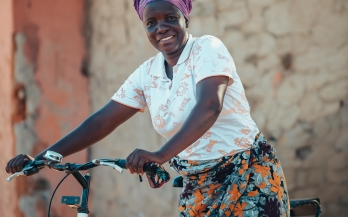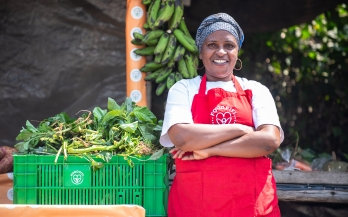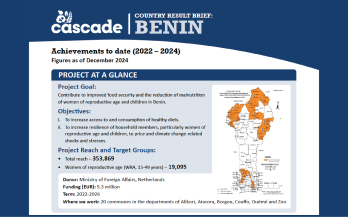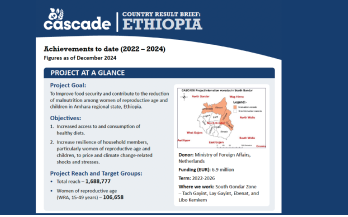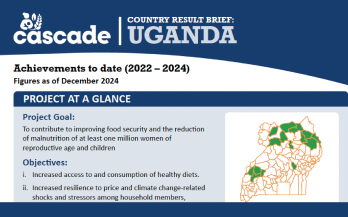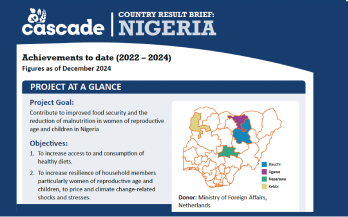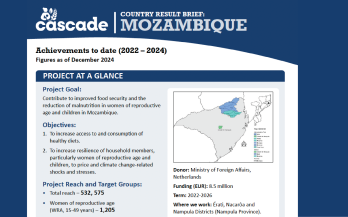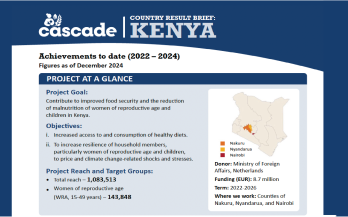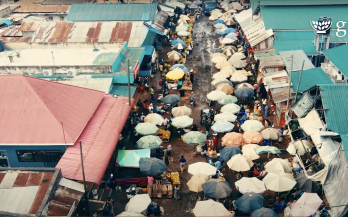- 10/03/2025
Packaging can keep foods safe; help make them appealing, convenient, and long-lasting; and convey key information about them to consumers. At the same time, packaging is an important contributor to food system waste and a major driver of certain foods’ prices in LMICs. As such, it is a sector ripe for creative disruption as part of food system transformation – to ensure safe, nutritious foods can reach the consumers who need them, in affordable forms and with limited negative environmental impact. This paper has considered in detail three packaging innovations that could be used to make nutritious foods more accessible to lower-income consumers: single-serve packaging, reusable packaging, and selling products in bulk without individual packaging.
Previously, we showed how NutriBaik is changing lives through this story. Today, we talk to Ancha Monequete on why she “finds hope in NutriBaik”. Here we see how, through women the NutriBaik, women are playing their part in the functioning of food systems.
As the world marks International Women’s Day 2025, we celebrate the resilience, ingenuity, and contribution of women in driving economic growth and improving household nutrition. In Kenya, one of the most visible yet often overlooked players in this space is the mama mboga (the last-mile vegetable vendor) who ensures families have access to fresh and affordable produce daily.
- 06/03/2025
Project Description CASCADE Benin works to support and strengthen national nutrition policies in 20 communes in six of the country’s 12 departments. Implemented by CARE and GAIN in partnership with nine local organizations, the project aligns with the priorities identified in Benin’s National Food and Nutrition Policy (Politique Nationale de l’Alimentation et de la Nutrition (PNAN).
- 06/03/2025
The CAtalyzing Strengthened policy aCtion for heAlthy Diets and resiliencE (CASCADE) focuses on improving nutrition and food security by promoting healthier diets through multisectoral collaboration and evidencebased food and nutrition-related policies.
- 06/03/2025
Project Description
In Uganda approximately 29% and 53% of children below the age of five years are stunted and anemic, respectively. Additionally, one-third (32%) of women aged 15-49 years are anemic. Access to and consumption of healthy diets remains a challenge for women and children
- 06/03/2025
Project Description
The Catalyzing Strengthened policy Action for Healthy Diets and resiliencE (CASCADE) project champions multi-sectoral nutrition strategies, scaling up actions and complementing the Government of Nigeria’s efforts to strengthen diets as described in the National Food and Nutrition Policy and Multi-sectoral Plan of Action for Food and Nutrition. CASCADE brings Nigeria’s private sector agri-food system actors together with
- 06/03/2025
Project Description
The Catalyzing Strengthened policy Action for Healthy Diets and resiliencE (CASCADE) project is strengthening Mozambique’s food and nutrition security by fostering collaboration among government, the private sector, and communities. CASCADE frames its activities in Mozambique’s national Food and Nutrition Security Strategy 2024-2030 and the National Strategy of Food Fortification 2023-2027. The project focuses on reinforcing government capacity for policy coordination, fostering collaboration between the public and private sectors to strengthen nutrition-related businesses, and empower community-based organizations to advocate for better nutrition and agricultural services. These efforts are complemented by ensuring that nutritional outcomes are considered within agriculture and health interventions. Crosscutting to its work, CASCADE is supporting both policymakers to make evidence-based decisions and stakeholders working across Mozambique’s food and nutrition security landscape.
- 06/03/2025
The CAtalyzing Strengthened policy aCtion for heAlthy Diets and resiliencE (CASCADE) project is responding to high malnutrition rates in Kenya and is strengthening implementation of nutrition related policies. The priority policy focus is the Kenya National Nutrition Action Plan which aims to accelerate and scale up efforts towards the elimination of malnutrition in Kenya in line with Kenya’s Vision 20301 and global Sustainable Development Goals.
This video showcases GAIN’s collaboration with Buguruni Market (Dar es Salaam, Tanzania). It illustrates the early testing of the Food Systems Governance model; highlighting the importance of i) knowing the local food system, ii) One Nutrition (nutrition, food hygiene and safety, reduced food waste), and iii) engaging multiple stakeholders to co-design and support infrastructure investments that enhance vendor livelihoods, as well as improve the quality, safety, and value of food stored, upcycled, and sold to consumers.

